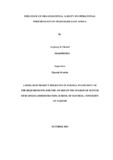| dc.description.abstract | In today‟s volatile market, market competition is causing both demand and supply to
fluctuate more rapidly, widely, and frequently than they used to. Under this condition,
firms ought to be agile and be able to sense and respond to market changes quickly
and smoothly to maintain their operational performance. Organizational agility, which
emphasizes rapid and innovative response to market change, thus is becoming a
critical weapon to respond to market uncertainties and opportunities. Organizational
agility dictates an organization„s capacity to adjust its internal processes in response
to changes in the environment. Agile firms are resilient to shocks and upheavals, As
such a firm remains an affected in terms of reliability, production cycle time and
inventory turn. Therefore, all organization TMEA included requires acquiring agility
to be able to respond to changes in business environment. This study seeks to
investigate influence of organizational agility on operational performance in TMEA.
This research problem was studied through the use of a descriptive research design.
The target population for this study was the employees of Trademark East Africa.
Also, transporters, clearing agents, recipients and government agencies were also are
targeted. Stratified random sampling was used to select the study sample. Primary
data was gathered through questionnaires and an interview guide. Both qualitative and
quantitative methods were used for data analysis. The quantitative data in this
research was analyzed by descriptive statistics using statistical package for social
sciences (SPPS) version 20 while qualitative data was analyzed using content
analysis.
The study revealed that Information technologies provided superior information
management capabilities, analytical decision support, and enhanced communication
for achievement of enhanced operational performance, and that IT helps firms in
sharing of knowledge and development of skills in addressing their operational
problems, the practice of HRM needs to be integrated with the overall strategy to
ensure effective use of people and provide better returns to the organizations in terms
of ROI (Return on Investment), strategic alliance can provide a powerful competitive
advantage in new markets, cost, speed, knowledge, and technology access. Therefore
the study concludes that adoption of IT, human resources management practices and
strategic alliances by TMEA all had appositive influence its operational performance.
The study recommends that organisations need to adopt the use of ICT in their
business operations, as ICT adoption was found to enhance organisational internal
efficiency through reduction of operational cost and thus enhancing management,
organisations need to have a strategic human resource plan in place, this will to help
to highlight talent shortages, speeding up the process of identifying sources of new
talent that could, upon hire, make significant business impact; organisations need to
look forward in forming strategic alliances, formation of strategic alliance will helps
to achieve organizational objectives better through collaboration and to gain access to
intangible assets like brand name and expertise and that organization need also
embrace change management strategies as this was found to be positively related with
organisational competitiveness. | en_US |

